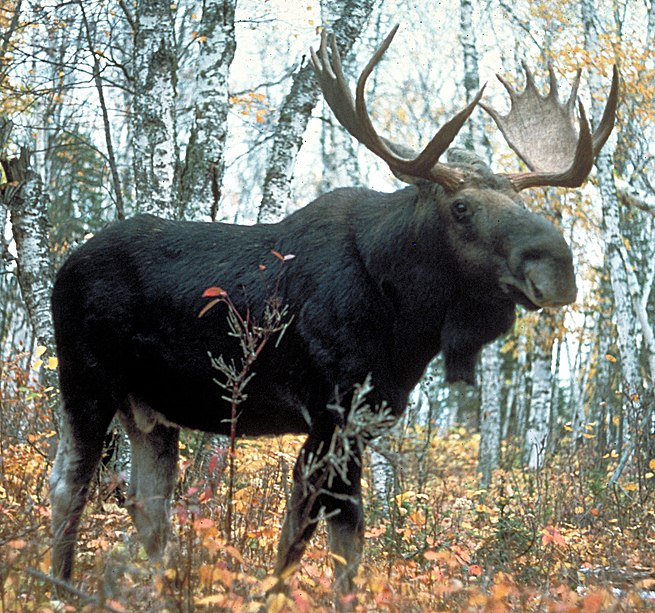
Main Difference
The main difference between Moose and Elk is that the Moose is a species of mammal and Elk is a one of the largest species within the Cervidae or deer family in the world.
-
Moose
The moose (North America) or elk (Eurasia), Alces alces is a member of the New World deer subfamily and is the largest and heaviest extant species in the Deer family. Moose are distinguished by the broad, palmate (open-hand shaped) antlers of the males; other members of the deer family have antlers with a dendritic (“twig-like”) configuration. Moose typically inhabit boreal forests and temperate broadleaf and mixed forests of the Northern Hemisphere in temperate to subarctic climates. Hunting and other human activities have caused a reduction in the size of the moose’s range over time. Moose have been reintroduced to some of their former habitats. Currently, most moose are found in Canada, Alaska, New England (with Maine having the most of the lower 48 states), Fennoscandia, Baltic states, and Russia. Their diet consists of both terrestrial and aquatic vegetation. The most common moose predators are the gray wolf along with bears and humans. Unlike most other deer species, moose are solitary animals and do not form herds. Although generally slow-moving and sedentary, moose can become aggressive and move quickly if angered or startled. Their mating season in the autumn features energetic fights between males competing for a female.
-
Elk
The elk or wapiti (Cervus canadensis) is one of the largest species within the deer family, Cervidae, in the world, and one of the largest land mammals in North America and Eastern Asia. This animal should not be confused with the still larger moose (Alces alces) to which the name “elk” applies in British English and in reference to populations in Eurasia.
Elk range in forest and forest-edge habitat, feeding on grasses, plants, leaves, and bark. Male elk have large antlers which are shed each year. Males also engage in ritualized mating behaviors during the rut, including posturing, antler wrestling (sparring), and bugling, a loud series of vocalizations that establishes dominance over other males and attracts females.
Although they are native to North America and eastern Asia, they have adapted well to countries in which they have been introduced, including Argentina and New Zealand. Their great adaptability may threaten endemic species and ecosystems into which they have been introduced.
Elk are susceptible to a number of infectious diseases, some of which can be transmitted to livestock. Efforts to eliminate infectious diseases from elk populations, largely by vaccination, have had mixed success.
Some cultures revere the elk as a spiritual force. In parts of Asia, antlers and their velvet are used in traditional medicines. Elk are hunted as a game species. The meat is leaner and higher in protein than beef or chicken.It was long believed to be a subspecies of the European red deer (Cervus elaphus), but evidence from many mitochondrial DNA genetic studies beginning in 1998 show that the two are distinct species. Key morphological differences that distinguish C. canadensis from C. elaphus are the former’s wider rump patch and paler-hued antlers.
-
Moose (noun)
The largest member of the deer family (Alces alces), of which the male has very large, palmate antlers.
“We saw a moose at the edge of the woods.”
-
Moose (noun)
An ugly person.
-
Moose (noun)
A stew.
-
Elk (noun)
Any large species of deer such as red deer, moose or wapiti.
-
Elk (noun)
The subspecies of the moose (Alces alces alces, alternatively named Eurasian elk because the wapiti is also called elk) that occurs only in Europe and Asia (not to be confused with the species called moose {Alces alces} which encompasses all subspecies of the moose).
-
Elk (noun)
The largest member of the deer family (Alces alces); a moose.
-
Elk (noun)
The common wapiti (Cervus canadensis); the second largest member of the deer family, smaller only than a moose.
